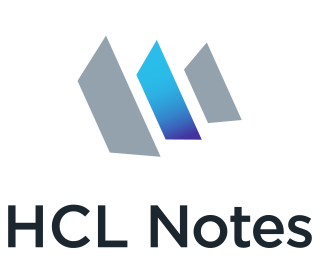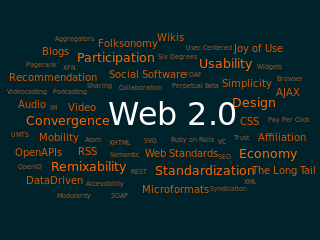Related Research Articles

HCL Notes is a proprietary collaborative software platform for Unix, Windows, Linux and macOS, sold by HCLTech. The client application is called Notes while the server component is branded HCL Domino.
HCL Sametime Premium is a client–server application and middleware platform that provides real-time, unified communications and collaboration for enterprises. Those capabilities include presence information, enterprise instant messaging, web conferencing, community collaboration, and telephony capabilities and integration. Currently it is developed and sold by HCL Software, a division of Indian company HCL Technologies, until 2019 by the Lotus Software division of IBM.

Web 2.0 refers to websites that emphasize user-generated content, ease of use, participatory culture, and interoperability for end users.
WebSphere Application Server (WAS) is a software product that performs the role of a web application server. More specifically, it is a software framework and middleware that hosts Java-based web applications. It is the flagship product within IBM's WebSphere software suite. It was initially created by Donald F. Ferguson, who later became CTO of Software for Dell. The first version was launched in 1998. This project was an offshoot from IBM HTTP Server team starting with the Domino Go web server.
A mashup, in web development, is a web page or web application that uses content from more than one source to create a single new service displayed in a single graphical interface. For example, a user could combine the addresses and photographs of their library branches with a Google map to create a map mashup. The term implies easy, fast integration, frequently using open application programming interfaces and data sources to produce enriched results that were not necessarily the original reason for producing the raw source data. The term mashup originally comes from creating something by combining elements from two or more sources.

ArcGIS is a family of client, server and online geographic information system (GIS) software developed and maintained by Esri.

Uniface is a low-code development and deployment platform for enterprise applications that can run in a large range of runtime environments, including mobile, mainframe, web, Service-oriented architecture (SOA), Windows, Java EE, and .NET. Uniface is used to create mission-critical applications.
A software factory is a structured collection of related software assets that aids in producing computer software applications or software components according to specific, externally defined end-user requirements through an assembly process. A software factory applies manufacturing techniques and principles to software development to mimic the benefits of traditional manufacturing. Software factories are generally involved with outsourced software creation.
Mobile app development is the act or process by which a mobile app is developed for one or more mobile devices, which can include personal digital assistants (PDA), enterprise digital assistants (EDA), or mobile phones. Such software applications are specifically designed to run on mobile devices, taking numerous hardware constraints into consideration. Common constraints include CPU architecture and speeds, available memory (RAM), limited data storage capacities, and considerable variation in displays and input methods. These applications can be pre-installed on phones during manufacturing or delivered as web applications, using server-side or client-side processing to provide an "application-like" experience within a web browser.
IBM App Connect Enterprise (abbreviated as IBM ACE, formerly known as IBM Integration Bus, WebSphere Message Broker, WebSphere Business Integration Message Broker, WebSphere MQSeries Integrator and started life as MQSeries Systems Integrator. App Connect IBM's integration software offering, allowing business information to flow between disparate applications across multiple hardware and software platforms. Rules can be applied to the data flowing through user-authored integrations to route and transform the information. The product can be used as an Enterprise Service Bus supplying a communication channel between applications and services in a service-oriented architecture. App Connect from V11 supports container native deployments with highly optimised container start-up times.
Adobe LiveCycle Enterprise Suite (ES4) is a service-oriented architecture Java EE server software product from Adobe Systems used to build applications that automate a broad range of business processes for enterprises and government agencies. LiveCycle ES4 is an enterprise document and form platform that helps you capture and process information, deliver personalized communications, and protect and track sensitive information. It is utilized for purposes such as account opening, services, and benefits enrollment, correspondence management, requests for proposal processes, and other manual-based workflows. LiveCycle ES4 incorporates new features with a particular focus on mobile devices. LiveCycle applications function in both online and offline environments. These capabilities are enabled through the use of Adobe Reader, HTML/PhoneGap, and Flash Player clients to reach desktop computers and mobile devices.
HCL Connections is a Web 2.0 enterprise social software application developed originally by IBM and acquired by HCL Technologies in July 2019. Connections is an enterprise-collaboration platform which aims to helps teams work more efficiently. Connections is part of HCL collaboration suite which also includes Notes / Domino, Sametime, Portal and Connections.
Klipfolio Inc., is a Canadian software company founded in 2001 and headquartered in Ottawa, Ontario. The company initially focused on the consumer market, and later moved into the dashboard and business intelligence space. On Feb 25, 2015 they announced a series A round of $6.2 million and in 2017 they raised $12M Series B Funding.

SharePoint is a collection of enterprise content management and knowledge management tools Microsoft. Launched in 2001, it was initially bundled with Windows Server as Windows SharePoint Server, then renamed to Microsoft Office SharePoint Server, and then finally renamed to SharePoint. It is provided as part of Microsoft 365, but can also be configured as to run as On-premises software.

WaveMaker is a Java-based low-code development platform designed for building software applications and platforms. The company, WaveMaker Inc., is based in Mountain View, California. The platform is intended to assist enterprises in speeding up their application development and IT modernization initiatives through low-code capabilities. Additionally, for independent software vendors (ISVs), WaveMaker serves as a customizable low-code component that integrates into their products.
InetSoft Technology Corporation is a privately owned multinational computer software company that develops free and commercial web-based business intelligence applications. The company was founded in 1996, and currently has over 120 employees between its corporate headquarters in Piscataway, New Jersey, and development offices in Beijing and Xi'an, China.
TigerLogic Corporation was an American internet and software development company that designed, developed, sold and supported software infrastructure products. This software was categorized into the following product lines: Yolink search enhancement technology, XML Data Management Server (XDMS), Multidimensional Data Management System (MDMS) and Rapid Application Development (RAD) software tools. TigerLogic was dissolved in 2016, with its MultiValue database products sold to Rocket Software, and its Omnis products sold to UK-based OLS Holdings Ltd.
Lotus Mashups is a business mashups editor developed and distributed by IBM as part of the IBM Mashup Center system. Lotus Mashups is intended for use in professional environments, such as corporations and governments.
WebSphere Portal is an enterprise software used to build and manage web portals. It provides access to web content and applications, while delivering personalized experiences for users.

CARTO is a software as a service (SaaS) spatial analysis platform that provides GIS, web mapping, data visualization, spatial analytics, and spatial data science features. The company is positioned as a Location Intelligence platform due to its tools for geospatial data analysis and visualization that do not require advanced GIS or development experience. As a cloud-native platform, CARTO runs natively on cloud data warehouse platforms overcoming any previous limits on data scale for spatial workloads.